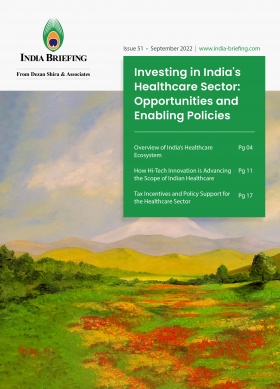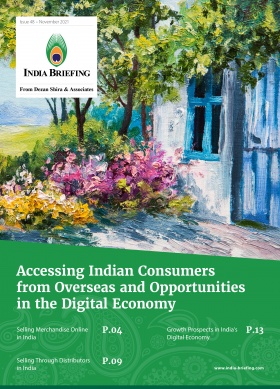FSSAI Approval Mandatory for Foreign Manufacturers of Specified Food Exports to India in 2023: Key Details
Starting from February 1, 2023, foreign food manufacturers in five food categories who intend to export to the Indian market will be mandated to register their facilities with the Food Safety and Standards Authority of India (FSSAI).
In this article, we highlight the procedure for registration, along with relevant format. We also detail the provisions of Food Safety and Standards (Imports) First Amendment Regulations, 2021, under which such registrations are to be done.
In a recent circular issued on October 10, 2022, the Food Safety and Standards Authority of India (FSSAI) made registrations mandatory for foreign food manufacturing facilities which export certain food items, such as meat, milk, and infant foods, to India. The new rules will be applicable from February 1, 2023.
As per the circular, the registration procedure for foreign food manufacturing facilities in five food categories who intend to export these products to India will be as per the Food Safety and Standards (Imports) First Amendment Regulations, 2021.
READ: Food Import Procedure in India and FSSAI’s Latest Regulatory Changes
Which category of products are subject to new FSSAI regulations?
Food manufacturing facilities exporting to India under the following five categories will be subject to registration:
- Milk and milk products
- Meat and meat products, including poultry, fish and their products
- Egg powder
- Infant food
- Nutraceuticals
How will FSSAI proceed with the registration of foreign food manufacturers?
The FSSAI has requested all competent authorities of exporting foreign countries to provide the list of existing manufacturers and those who intend to export these food products to India.
The authorities are to follow the following format and send the list to following email-ids: dramit.sharma@fssai.gov.in and import@fssai.gov.in
|
Format for Registration of Foreign Food Manufacturing Facilities |
||
|
1. |
Competent authority in exporting country |
|
|
2. |
Details of food manufactures |
|
|
3. |
Approval/ license number approved by competent authority |
|
|
4. |
Name and HS Code of products to be exported to India |
|
Based on information provided by them, the FSSAI will register these facilities on its web portal.
Food Safety and Standards (Imports) First Amendment Regulations, 2021
FSSAI is a statutory body established under the Food Safety and Standards Act, 2006, which is a consolidating statute related to food safety and regulation in India.
It notified the Food Safety and Standards (Import) First Amendment Regulations, 2021 in November 2021, which came into effect from June 1, 2022.
The amendment policy stipulates the following process to register foreign food manufacturing facilities for purpose of exports to India:
Registration of foreign food manufacturing facilities
- Foreign food manufacturing facilities falling under specified categories that seek to export such articles of food to India shall register with the Food Authority before exporting to India.
- The foreign food manufacturing facility, either directly or through an authorised representative, may apply for registration in “Form 16” of these regulations along with documents specified in Annexure-1 and fee as specified.
Processing of application for registration of foreign food manufacturing facilities
- If upon scrutiny of the application, the FSSAI requires any additional information with respect to an application or if the application is incomplete, it shall advise the applicant, to furnish such additional information or complete the application, as the case may be, within 30 days from such notice. In case the applicant fails to furnish the required information within the stipulated time of 30 days, the application for registration of foreign food manufacturing facility shall stand rejected.
- On receipt of a complete application, including the additional information if asked, the FSSAI may process the application for inspection and issue registration or rejection of the application.
Inspection of foreign food manufacturing facilities
- Foreign food manufacturing facilities may be inspected, if required, in a manner as specified by FSSAI. However, no inspection shall be required in case of such categories of food that are covered under mandatory Bureau of Indian Standards (BIS) Certification Mark Scheme and where the BIS scheme of inspection includes the requirements specified under Schedule 4 of the Food Safety and Standards (Licensing and Registration of Food Businesses) Regulations, 2011.
- These facilities may also be inspected after the issuance of registration, as deemed necessary.
- Officials from FSSAI and relevant ministry or organization or department or recognised auditing agency shall be nominated by the FSSAI for the purpose of inspection of these facilities.
- FSSAI, if required may prescribe cost of inspection, which shall be borne by the foreign food manufacturing facility.
Issuance of registration
- The foreign food manufacturing facility found to be compliant to the Food Safety and Standards Act and the rules and regulation made there-under – shall be registered for a period of two years and their registration number shall be communicated in Form 17.
- Such facilities that do not meet compliance of relevant rules and regulations will have their application for registration rejected.
- The foreign food manufacturing facility whose application is rejected, after taking remedial action, may apply for registration again.
- Renewal of registration of such facilities shall be made in Form 16, not later than 30 days prior to the expiry date indicated in the registration approval.
About Us
India Briefing is produced by Dezan Shira & Associates. The firm assists foreign investors throughout Asia from offices across the world, including in Delhi and Mumbai. Readers may write to india@dezshira.com for more support on doing business in in India.
We also maintain offices or have alliance partners assisting foreign investors in Indonesia, Singapore, Vietnam, Philippines, Malaysia, Thailand, Italy, Germany, and the United States, in addition to practices in Bangladesh and Russia.
- Previous Article Import-Export in India 2022: tendenze e procedure chiave
- Next Article Export-Import in India FY 2023: Trends and Key Procedures








